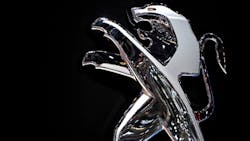PSA Peugeot Citroen plans to return to the U.S. after a 25-year absence by taking on mobility services like Uber Technologies Inc. and Daimler AG’s Car2go, as the French automaker strains to find growth opportunities in Europe.
As part of a strategy aimed at boosting revenue 25% by 2021, the company, which is now calling itself Groupe PSA (IW 1000/58), plans to broaden its range of services in addition to expanding its traditional automaking business in places like Iran, India and southeast Asia. Emerging mobility offerings will provide a route back to the U.S., where Peugeot hasn’t sold cars since 1991, Chief Executive Officer Carlos Tavares said during the presentation of his “Push to Pass” growth plan.
“PSA will not become a global company if it doesn’t come back to North America,” Tavares said. “We notice that our main competitors have been there for 50 years, but those who have been there for 50 years are also the ones we are beating in Europe and China.”
Peugeot’s expansion in the U.S. and elsewhere is part of an effort to become less dependent on Europe, which accounted for 62% of its auto sales last year. The market’s decline to a two-decade low in the aftermath of the sovereign-debt crisis prompted a bailout by the French government and China’s Dongfeng Motor Corp. in 2014.
Push to Pass Growth Plan
Peugeot, which operates the Mu and Multicity car-sharing businesses in Europe, has a 10-year plan to return to North America, Tavares said. The first stage would be to establish services, most likely together with partner Bollore Group, which runs Paris’s Autolib electric-car offering. The second stage would be to equip those fleets with vehicles from the company before a broader rollout.
A full return to the U.S. “will cost a significant amount of money,” said Sascha Gommel, an analyst with Commerzbank AG. “No one knows the brand, so why would you go for that?”
Peugeot’s stock tumbled 6.5%, the biggest drop since Sept. 22, to 13.72 euros in Paris trading. The shares have lost 15% this year, valuing the company at 11.1 billion euros (US$12.6 billion).
Europe’s second-largest carmaker is shifting to expansion after years of restructuring that included shutting a plant, freezing pay and weeding out underperforming models. Those moves helped Peugeot reach earnings targets ahead of schedule, but now Tavares, an avid car racer, is pushing to compete toe-to-toe with larger rivals.
Even though Peugeot is a major player in Europe, its global deliveries, which totaled 2.97 million vehicles last year, are small compared to its main competitors. French rival Renault SA sold 8.5 million cars together with its alliance partner Nissan Motor Co., and Volkswagen AG, Europe’s No. 1, delivered nearly 10 million autos in 2015.
Peugeot’s growth plan includes introducing 26 cars and eight commercial vehicles in the coming years. The strategy calls for one new car to be rolled out every year for each of its three brands, which include the mass-market Peugeot and Citroen nameplates and the upscale DS badge. Peugeot also plans to push connectivity technologies as well as roll out seven plug-in hybrids and four electric vehicles.
Koolicar Stake Underpins Services Growth
To underpin its expansion in services, Peugeot plans to spend 100 million euros on venture capital investments. Last week, the company was part of a group that paid 18 million euros for a stake in French car-sharing startup Koolicar.
The goal is to increase revenue 10% by 2018 from 54.7 billion euros in 2015, and an additional 15% growth by 2021. But the expansion will cost money and that could weigh on profitability. Peugeot forecast that its automotive operating profit will average 4% of sales between 2016 and 2018. That’s below the 5% margin posted last year. The goal is to lift margin to 6% by 2021.
To counter the cost of expansion as well as plans to reinstate a dividend after refraining from payouts since 2011, Peugeot will maintain its “frugal” approach to development spending and keep “rigorous” control over production and fixed costs, the Paris-based company said Tuesday in a statement. The effort includes plans to save 700 euros on each car produced in Europe.
Moody’s Investors Service upgraded Peugeot’s credit rating to Ba2, the second-highest non-investment grade, citing the company’s prospects for improved earnings and tight cost controls.
About the Author
Bloomberg
Licensed content from Bloomberg, copyright 2016.
